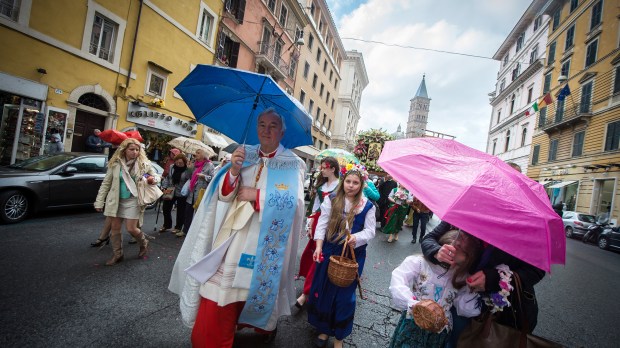The Advocate, the Holy Spirit, whom the Father will send in my name, will teach you everything and remind you of all that I told you. Peace I leave with you; my peace I give to you.—John 14:26-27a
Prior to entering formation with the Society of the Divine Savior (the Salvatorians) this past January, I was a Benedictine monk for more than a decade. And as a Benedictine, I was immersed in the very practical wisdom of St. Benedict and the Rule he wrote for his monks more than 1400 years ago.
One of the defining characteristics of this great saint was his balanced understanding of the human person and of community dynamics. We see this at work in the third chapter of his Rule and his insistence that the abbot of the monastery call the community together whenever there was important business to discuss: “Let the abbot call together the whole community and state the matter to be acted upon. … The reason we have said that all should be called for counsel is that the Lord often reveals to the younger what is best.”
We see the same wisdom was at work in the First Reading of this Sunday’s Mass. Recall how in the Acts of the Apostles St. Luke presented that first generation of believers as living an almost idyllic existence, devoting themselves to the apostles’ teachings, “and the communal life, to the breaking of the bread and to the prayers. … All who believed were together and had all things in common; they would sell their property and possessions and divide them among all according to each one’s need” (2:42, 44-45).
But this way of life was short-lived. After a short time, the Church faced persecution and wrestled with questions of inclusivity and what should be expected of the growing number non-Jewish believers. While this might seem like a small issue for us today, this all-important question threatened to tear the Church apart. Recognizing what was at stake, the community had to discern how to respond to the challenges they faced.
So what did the leaders of the Church do? They came together as a community, prayed and listened to one another. Together they discerned how the Holy Spirit was at work in the Church — just as Jesus had promised it would be.
In the end, rather than closing ranks and opting for exclusivity, the Church’s first leaders imagined a new way forward and enlisted others to help them in their mission: “The apostles and elders, in agreement with the whole church, decided to choose representatives and to send them to Antioch with Paul and Barnabas. The ones they chose were Judas, who was called Barsabbas, and Silas, leaders among the brothers” (Acts 15:22).
Humbly recognizing both their own limitations and opportunities before them, the leaders looked beyond the enclosed circle of the Apostles to find new workers capable of responding to the present needs.
This willingness to “look beyond the boundaries” was held up as the ideal for the Church by Cardinal Jorge Bergoglio only days before he was Pope in 2013. In a speech delivered during the “general congregations” preceding the conclave, he said:
Evangelizing presupposes a desire in the Church to come out of herself. The Church is called to come out of herself and to go to the peripheries, not only geographically, but also in the existential peripheries: the mystery of sin, of pain, of injustice, of ignorance, and indifference to religion, of intellectual currents, and of all misery.
Despite criticism from many fronts, Pope Francis has made this vision of a Church moving “beyond the boundaries” the guiding principle of his ministry. He certainly expects nothing less of us.
In the end, what’s at stake in all of this is the mission of the Church. Mutual discernment and collaboration in ministry—as we see it at work in the early Church and in St. Benedict’s monks—calls for each one of to step up and own our faith, living out our unique vocation. Each one of us has a part to play. This is what we’re called to and this is how we help the Church more perfectly reflect the beauty of that heavenly Jerusalem (cf. the Second Reading), becoming more than we ever imagined she — that is, more than we — could be.
How is God inviting you to share your gifts with others? What “boundaries” limit your service and ministry?
How does the experience of those early Christians challenge you to be open and to listen to the perspectives and experiences of others?
What opportunities for new service and ministry do you see for your faith community or family? How can you help make those a reality?
Words of Wisdom: “In a priggish culture such as ours, this magnanimity of spirit is precisely what we lack, and if we persist in denying any truth but our own, the danger to society is that our perspective will remain so narrow and self-serving that we lose the ability to effect a meaningful change. … This mentality may be of some use in business, but in a family, including a family of faith, it is a disaster.”—Kathleen Norris in Acedia & Me
Silas S. Hendersonis in formation with the Society of the Divine Savior (the Salvatorians) and currently serves as the managing editor of Abbey Press Publications and Deacon Digest magazine. He is the author of numerous reflections and books. He can be found at www.fromseason2season.blogspot.com and www.facebook.com/SilasSHenderson.

